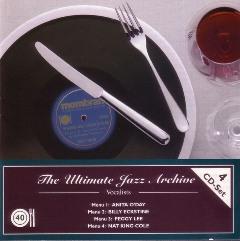The Ultimate Jazz Archive Vol.160 – Nat King Cole [1943-1946] [2005]
The Ultimate Jazz Archive Vol.160 – Nat King Cole [1943-1946] [2005]

01.Sweet Lorraine 02.Embraceable You 03.It’s Only A Papermoon 04.I Just Can’t See For Looking 05.I Realize Now 06.I’d Love To Make Love To You 07.Katusha 08.You’re Nobody ‘Till Somebody Loves You 09.Don’t Blame Me 10.I’m Thru With You 11.I’m In The Mood For Love 12.I Don’t Know Why 13.Route 66 14.Everyone Is Sayin’ Hello Again 15.What Can I Say After I Say I’m Sorry 16.Could-’Ja 17.Baby, Baby All The Time 18.You Call It Madness 19.Look What You Have Done To Me 20.It Only Happens Once
Nat “King” Cole conquered the pop charts in the Fifties and early Sixties as a warm-voiced singer of orchestrated ballads like “Mona Lisa” and “Unforgettable,” and breezy, countrified sing-alongs including “Ramblin’ Rose” and “Those Lazy-Hazy-Crazy Days of Summer.” Less well known is the fact that he played a mean piano (in the style of Earl “Fatha” Hines) and led a swinging jazz trio from 1937 to 1955. Cole’s drummerless trio was an innovation, and no less an authority than Count Basie marveled at their improvisational interplay: “Those cats used to read each other’s minds — it was unbelievable.” Early stirrings of rock and roll can be detected in such swinging, lingo-filled tunes as “Straighten Up and Fly Right” and “(Get Your Kicks on) Route 66,” recorded in 1943 and 1946, respectively, by the King Cole Trio. With its three guitars, honking sax and gritty vocal, the 1957 hit “Send for Me” (Number One R&B, Number Six pop) was formally as close as Cole ever got to rock and roll.
Nathaniel Adams Coles was born in Montgomery, Alabama, in 1919. His mother was a church choir director, and his father was a Baptist pastor. When he was four years old, Cole and his family moved to Chicago. Around the same time, Cole learned how to play piano. He then began formal piano training when he was in his teens. He was inspired by the piano playing of Earl Hines, and when he was 15, he dropped out of school to become a full-time jazz piano player.
In 1937, a club owner in Los Angeles – where Cole had moved to after playing piano in a national tour of Eubie Blake’s Shuffle Along – christened him Nat “King” Cole, and that same year he formed the King Cole Trio. The jazz trio toured extensively and signed with Capitol Records in 1943. That same year, the trio hit the charts with the song “That Ain’t Right.” The trio scored another hit the following year with “Straighten Up and Fly Right,” a song based on one of Cole’s father’s sermons. That record sold 500,000 copies.
Cole’s transformation from jumpin’ jive to pop balladry came in 1946, when “(I Love You) For Sentimental Reasons” became a million seller for the King Cole Trio. When his first orchestrated number, the definitive version of Mel Torme’s classic “The Christmas Song (Merry Christmas to You),” became a seasonal hit that same year, there was virtually no turning back.
Cole continued to score hits with such songs as 1948’s “Nature Boy” and 1950’s “Mona Lisa.” The following year, Cole hit Number One with the song “Too Young.” That same year he had another hit with “Unforgettable.” During this period, Cole also worked as a session musician, recording with such artists as Louis Armstrong and Ella Fitzgerald.
In 1956, Cole made television history when he became the first African-American host of a variety television series. The Nat King Cole Show, which remained on the air until December 1957, featured performances by such artists as Count Basie, Tony Bennett, Sammy Davis Jr. and Peggy Lee.
The Fifties and Sixties found Cole recording with various orchestras, including Nelson Riddle’s and Billy May’s. While his work from this period shared little with the rock and roll revolution that was under way, Cole’s broader influence on the idiom as a musical pioneer and as a popular star is undeniable. In 1962, he scored a Number Two pop hit with “Ramblin’ Rose,” and the following year he scored another big hit with “Those Lazy-Hazy-Crazy Days of Summer,” which reached Number Six on the charts.
Cole’s final chart hits came in 1964, with the songs “I Don’t Want to Hurt Anymore” and “I Don’t Want to See Tomorrow.”
Over the course of his career, Cole appeared on numerous television shows and in several feature films. In 1958, he played the role of W.C. Handy in the film St. Louis Blues, and in 1965, he appeared alongside Jane Fonda and Lee Marvin in Cat Ballou.
In December 1964, Cole was diagnosed with lung cancer. That same month, he released his last album, L-O-V-E, which reached Number Four on the charts. Nat “King” Cole died on February 15, 1965. He was 45 years old.
In 1991, Mosaic Records released an 18-CD box set, The Complete Capitol Recordings of the Nat King Cole Trio. It included 349 songs. That same year, Cole’s daughter, Natalie Cole, scored a hit after she recorded a duet with her father, adding her vocals to his song “Unforgettable.” The father-daughter duet won seven Grammy awards. Nat Cole received a Grammy Lifetime Achievement Award in 1990. ---- rockhall.com
download: uploaded yandex 4shared mediafire solidfiles mega filecloudio nornar ziddu








